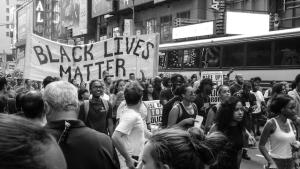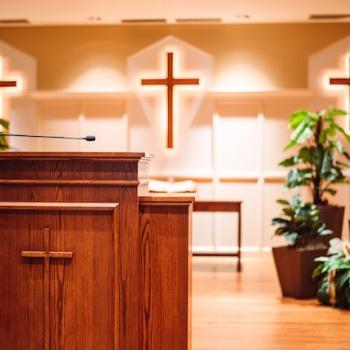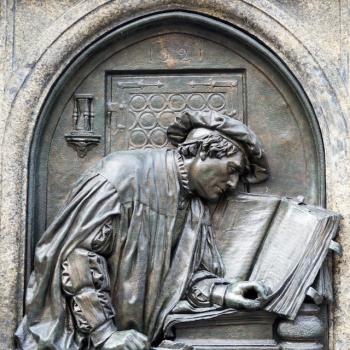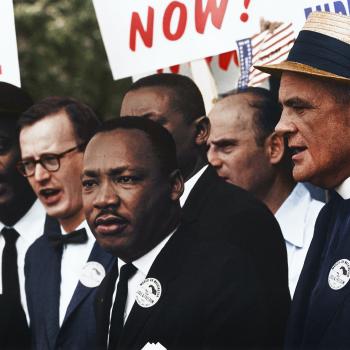I realize that the “love and justice” part of reading the Bible with a bias toward love and justice might sound a little vague. So I want to offer another angle on this, with a few more specifics. The angle: aligning our biases with God’s.
We’ve explored the idea (in the love and justice post) that we as humans are never without bias. We’ve also explored some of the ways these biases have gone badly awry, and what that might mean for us today.
Now, I want to get a little more into the specifics. What does it look like to go about aligning our biases with God’s?
Wait . . . God Is Biased?
I recently enjoyed Desmond Tutu’s book God is Not a Christian: And Other Provocations (HarperOne 2011). (Please do provoke us, Archbishop. We need it.)
I love how Tutu holds together two truths that might seem to exist in tension:
- God loves every person, values every person, and honors every person’s dignity—seeing all people as equals.
- God cares especially for people who are impoverished or otherwise marginalized, and God invites God’s people to do the same.
As far as the second point goes, Tutu puts it this way: “God is not evenhanded. God is biased horrendously” (p. 214).
I like this idea that God is “biased horrendously.” I appreciate the clarity it brings.
According to Tutu, as a few examples from the Bible, God is biased:
- Toward the enslaved people in the Exodus story.
- Toward those for whom harvesters were instructed to leave something (in the practice known as gleaning, outlined in Leviticus).
- Toward the alien and the outsider, because God’s people were aliens and outsiders themselves.
Tutu sums it up like this: “When you’re holy and the people of this God, you are always going to have to be biased in favor of the weak, the poor, the hungry” (p. 215). God is biased; therefore, we should be too.
You Don’t Have to Be Catholic to Want a Preferential Option for the Poor
The Catholic social teaching of a “preferential option for the poor” is more or less saying the same thing as Tutu. It’s another way of saying that God favors people who are impoverished, prioritizing their needs and well-being—and, I would say, honoring the gifts they have to offer.
I don’t know if Protestants are generally aware of this idea of a “preferential option for the poor.” I first heard the term when I read Tracy Kidder’s Mountains Beyond Mountains (as assigned summer reading before my freshman year of college—good choice, Stanford!), and it stuck with me. Dr. Paul Farmer’s global medical work with Partners in Health, although not specifically religious, is deeply motivated by Catholic social teachings that stem from Latin American liberation theology.
You don’t have to identify as Catholic to think that this idea of a “preferential option” is a good one. For me, it’s a helpful way of approaching religious thought (and life in general). And it’s a faithful way of reading the Bible.
When I say the Bible is about love and justice, part of what I mean is that the Bible is about rooting out inequality, equalizing humans, addressing and fighting the systems that make and keep people poor.
So, feel free to hold onto the term “preferential option for the poor” if you like it. Or feel free to leave it and find other language that resonates with you. It’s just another handle on the idea of God’s love and justice, another angle on what these things look like in our real (and very unjust) world.
It’s another way of saying that God is biased—in some very specific directions.
Not Unlike Black Lives Matter
It might sound jarring to say that God is biased. And on the flip side, it might sound nice to say that God is unbiased.
It strikes me, though, that saying “God is unbiased” is not totally unlike saying “all lives matter.”
Of course all lives matter. But people use this phrase as a response—a correction—to people who say “Black lives matter.” “All lives matter” is a way of refusing to pay particular attention to the ways Black lives have not been treated as lives that matter.

“All lives matter” may be true, but it is not how our world currently operates. And so, “Black lives matter” is what needs to be said. It’s the only thing that fully acknowledges the ways Black lives are not currently treated with value—that acknowledges this and tries to make it right.
Likewise, we could say that “God is unbiased”—and it would be true, in the sense that God loves everyone. But in our unjust world, God’s honor and dignity for everyone means special attention toward those whose lives are not treated with honor and dignity on a regular basis.
Explosive, in a Good Way
If, even considering all these things, the idea that God is biased is still controversial, that’s okay. Desmond Tutu gets this. As he recalls stories from the Bible that show God’s bias, Tutu goes on to say this: “Let’s read Bibles again, because they’re the most explosive things ever” (p. 214).
Let’s get back to those explosive Bibles.
I had to read that line a couple times. Because reading the Bible in ways that feel “explosive” is not necessarily a good thing in its own right. There are unproductive ways to be explosive, ways that “explode” toward injustice and further oppression.
But there are also productive ways to be “explosive.” There are ways of thinking and being, theologies and systems, that need to get blown up. (A couple years back I wrote a poem about a few of them.)
Not in a violent sense—I think often of Paul’s words in Ephesians, that our struggle is not against flesh and blood but against spiritual forces of evil in the heavenly realms. We don’t want to “blow up” people. But we do want to disrupt and shake up the systems that keep people trapped in cycles of poverty so that a few rich folks can keep getting richer.
This is the way in which the Bible is explosive. By constantly pushing toward love in a lonely world, community in an individualistic world (or at least in dominant white U.S. culture), justice in an unjust world, redistribution of resources in an unequal world, abundance in a world that fears scarcity.
Toward a world where everyone’s needs are met, such that everyone is able to give and receive in networks of belonging and mutuality. Let’s explode in these directions.
God is not unbiased. So let’s get to work aligning our biases with God’s.












